Otolanz PV Tablet 10's
MRP ₹305.5
(Inclusive of all Taxes)
₹45.8 Cashback (15%)
Provide Delivery Location
Online payment accepted
 Prescription drug
Prescription drugWhats That
Manufacturer/Marketer :
Consume Type :
Expires on or after :
Return Policy :
About Otolanz PV Tablet
Otolanz PV Tablet belongs to the class of medications called anti-vertigo medication used to treat the symptoms of Meniere's illness, which include dizziness (vertigo), ringing in the ears (tinnitus), nausea, and hearing loss. Meniere's disease is a medical condition that affects the inner ear and causes episodes of vertigo.
Otolanz PV Tablet contains Betahistine, Ginkgo biloba, Piracetam, Vinpocetine, and Vitamin D3. Betahistine lowers the pressure of the excess fluid and improves blood flow to the inner ear. Piracetam protects the nervous system and brain from shortness of oxygen. Vinpocetine and Ginkgo biloba protect the brain from free radical damage and increase blood flow to the brain. Vitamin D3 provides essential nutrients. Together, they help treat Meniere's illness.
Take the Otolanz PV Tablet with or after a meal. In some cases, Otolanz PV Tablet may cause side effects such as nausea, indigestion (acid reflux), bloating, minor stomach ache, and headache. Most of the side effects induced by this medication do not necessitate medical treatment and will resolve within a few days. However, get medical attention if the side effects persist or worsen.
Consult your doctor before using Otolanz PV Tablet if you are pregnant or breastfeeding. Keep your doctor informed about your health condition and all the medicines to rule out any side effects. Otolanz PV Tablet should not be given to children as safety and effectiveness have not been established. Otolanz PV Tablet may cause dizziness, so drive only if you are alert. Avoid consuming alcohol with Otolanz PV Tablet as it could lead to increased dizziness.
Uses of Otolanz PV Tablet
Directions for Use
Key Benefits
Otolanz PV Tablet is a blend of five medications: betahistine, ginkgo biloba, piracetam, vinpocetine, and vitamin D3. It is prescribed to treat symptoms of Meniere's disease including ringing in the ears (tinnitus), dizziness, vertigo, loss of balance, and hearing loss. Betahistine lowers the pressure of the excess fluid and improves blood flow to the inner ear. Piracetam protects the nervous system and brain from shortness of oxygen. Vinpocetine and Ginkgo biloba protect the brain from free radical damage and increase blood flow to the brain. Vitamin D3 provides essential nutrients. Together, they help treat Meniere's illness.
Storage
- Inform your doctor about dry mouth symptoms. They may adjust your medication regimen or prescribe additional medications to manage symptoms.
- Drink plenty of water throughout the day to help keep your mouth moist and alleviate dry mouth symptoms.
- Chew sugar-free gum or candies to increase saliva production and keep your mouth moisturized.
- Use saliva substitutes, such as mouthwashes or sprays, only if your doctor advises them to help moisturize your mouth and alleviate dry mouth symptoms.
- Avoid consuming smoking, alcohol, spicy or acidic foods, and other irritants that may aggravate dry mouth symptoms.
- Schedule regular dental check-ups to keep track of your oral health and handle any dry mouth issues as they arise.
- Inform Your Doctor: Notify your doctor immediately about your diarrhoea symptoms. This allows them to adjust your medication or provide guidance on managing side effects.
- Stay Hydrated: Drink plenty of fluids to replace lost water and electrolytes. Choose water, clear broth, and electrolyte-rich drinks. Avoid carbonated or caffeinated beverages to effectively rehydrate your body.
- Follow a Bland Diet: Eat easy-to-digest foods to help firm up your stool and settle your stomach. Try incorporating bananas, rice, applesauce, toast, plain crackers, and boiled vegetables into your diet.
- Avoid Trigger Foods: Steer clear of foods that can worsen diarrhoea, such as spicy, fatty, or greasy foods, high-fibre foods, and dairy products (especially if you're lactose intolerant).
- Practice Good Hygiene: Maintain good hygiene to prevent the spread of infection. To stay healthy, wash your hands frequently, clean and disinfect surfaces regularly, and avoid exchanging personal belongings with others.
- Take Anti-Diarrheal Medications: If your doctor advises, anti-diarrheal medications such as loperamide might help manage diarrhoea symptoms. Always follow your doctor's directions.
- Keep track of your diarrhoea symptoms. If they don't get better or worse or are accompanied by severe stomach pain, blood, or dehydration signs (like extreme thirst or dark urine), seek medical help.
- Take medications with food (if recommended): It can help prevent stomach distress and indigestion.
- Eat smaller, more frequent meals: Divide daily food intake into smaller, more frequent meals to ease digestion.
- Avoid trigger foods: Identify and avoid foods that trigger indigestion, such as spicy, fatty, or acidic foods.
- Stay upright after eating: Sit or stand upright for at least 1-2 hours after eating to prevent stomach acid from flowing into the oesophagus.
- Avoid carbonated drinks: Avoid drinking carbonated beverages, such as soda or beer, which can worsen indigestion.
- Manage stress: To alleviate indigestion, engage in stress-reducing activities like deep breathing exercises or meditation.
- Consult a doctor if needed: If indigestion worsens or persists, consult a healthcare professional to adjust the medication regimen or explore alternative treatments.
- Get enough sleep. Maintain a regular sleep cycle.
- Eat a healthy diet and exercise regularly.
- Manage stress with yoga or meditation.
- Limit alcohol and caffeine.
- Avoid driving or operating machinery unless you are alert.
- Contact your doctor immediately if you're experiencing a fast heart rate, palpitations, or other heart-related symptoms. This is crucial to determine whether the symptoms are related to your medication.
- Your doctor may need to adjust your medication regimen to alleviate the fast heart rate symptoms. This could involve changing the medication, reducing the dosage, or adding new medications to counteract the side effects.
- Follow your doctor's advice on monitoring your heart rate and blood pressure. This will help track any changes and ensure your heart rate returns normal.
- If you experience severe symptoms such as chest pain, dizziness, or shortness of breath, seek immediate medical attention. These symptoms can indicate a more serious condition that requires prompt treatment.
- Drink water or other clear fluids.
- To prevent worsening of pain, limit intake of tea, coffee, or alcohol.
- Include bland foods like rice, toast, crackers, and rice in your diet.
- Avoid lying down immediately after eating as it may cause indigestion or heartburn.
- Avoid acidic and spicy food as it may cause indigestion.
Drug Warnings
Do not use Otolanz PV Tablet without doctor advice if you had a skin reaction or irritation to any medicine. Inform your doctor if you have an arrhythmia, electrolyte imbalance, hypercalcemia, peptic ulcer, adrenal tumour, asthma, kidney or liver problems. Consult your doctor if you are pregnant or breastfeeding. This medication is not recommended for children or people who have galactose intolerance. Otolanz PV Tablet may cause drowsiness, so drive with caution. Avoid alcohol consumption as it may cause increased drowsiness. Keep your doctor informed about your health condition and medications to rule out any interactions.
Drug-Drug Interactions
Drug-Drug Interactions
Login/Sign Up
The combined use of aluminum hydroxide with Otolanz PV Tablet may increase the risk of toxicity.
How to manage the interaction:
Co-administration of Otolanz PV Tablet with Aluminium hydroxide can possibly result in an interaction, but it can be taken if your doctor has advised it. If you're having any of these symptoms like bone pain, muscle weakness, anemia, seizures, or dementia, it's important to contact your doctor right away. Do not stop using any medications without a doctor's advice.
The combined use of calcifediol with cholecalciferol can increase the risk of side effects.
How to manage the interaction:
Although there is a possible interaction between Otolanz PV Tablet and calcifediol, you can take these medicines together if prescribed by your doctor. If you notice any of these symptoms - irregular heartbeat, seizures, weakness, tiredness, headache, dizziness, ringing in the ears, loss of appetite, feeling sick, dry mouth, strange taste in your mouth, muscle or bone pain, thirst, losing weight, eye infection, sensitivity to light, runny nose or itching - contact a doctor right away. Do not discontinue any medications without consulting a doctor.
Cholecalciferol and doxercalciferol are forms of vitamin D, and taking too much vitamin D may lead to toxic effects.
How to manage the interaction:
Although there is a possible interaction between Otolanz PV Tablet and doxercalciferol, you can take these medicines together if prescribed by your doctor. If you notice any of these symptoms - irregular heartbeat, seizures, weakness, tiredness, headache, dizziness, ringing in the ears, loss of appetite, feeling sick, dry mouth, strange taste in your mouth, muscle or bone pain, thirst, losing weight, eye infection, sensitivity to light, runny nose or itching - make sure to call a doctor right away. Do not discontinue any medications without consulting a doctor.
Co-administration of Cholecalciferol and Calcitriol are forms of vitamin D, and taking too much vitamin D may lead to toxic effects.
How to manage the interaction:
Although there is a possible interaction between Otolanz PV Tablet and calcitriol, you can take these medicines together if prescribed by your doctor. If you notice any of these symptoms - irregular heartbeat, seizures, weakness, tiredness, headache, dizziness, ringing in the ears, loss of appetite, feeling sick, dry mouth, strange taste in your mouth, muscle or bone pain, thirst, losing weight, eye infection, sensitivity to light, runny nose or itching - contact a doctor right away. Do not discontinue any medications without consulting a doctor.
The combined use of cholecalciferol and paricalcitol are forms of vitamin D, and taking too much vitamin D may lead to toxic effects.
How to manage the interaction:
Although there is a possible interaction between Otolanz PV Tablet and paricalcitol, you can take these medicines together if prescribed by your doctor. If you notice any of these symptoms - irregular heartbeat, seizures, weakness, tiredness, headache, dizziness, ringing in the ears, loss of appetite, feeling sick, dry mouth, strange taste in your mouth, muscle or bone pain, thirst, losing weight, eye infection, sensitivity to light, runny nose or itching - contact a doctor right away. Do not discontinue any medications without consulting a doctor.
The combined use of cholecalciferol and ergocalciferol are forms of vitamin D, and taking too much vitamin D may lead to toxic effects.
How to manage the interaction:
Although there is a possible interaction between Otolanz PV Tablet and ergocalciferol, you can take these medicines together if prescribed by your doctor. If you notice any of these symptoms - irregular heartbeat, seizures, weakness, tiredness, headache, dizziness, ringing in the ears, loss of appetite, feeling sick, dry mouth, strange taste in your mouth, muscle or bone pain, thirst, losing weight, eye infection, sensitivity to light, runny nose or itching - contact a doctor right away. Do not discontinue any medications without consulting a doctor.
Taking Cholecalciferol together with Sucralfate may increase the risk or severity of kidney problems.
How to manage the interaction:
There may be a possibility of interaction between Cholecalciferol and Sucralfate, but it can be taken if prescribed by a doctor. Do not discontinue any medications without consulting a doctor.
Cholecalciferol and dihydrotachysterol are forms of vitamin D, and taking too much vitamin D may lead to toxic effects.
How to manage the interaction:
Although there is a possible interaction between Otolanz PV Tablet and dihydrotachysterol, you can take these medicines together if prescribed by your doctor. If you notice any of these symptoms - irregular heartbeat, seizures, weakness, tiredness, headache, dizziness, ringing in the ears, loss of appetite, feeling sick, dry mouth, strange taste in your mouth, muscle or bone pain, thirst, losing weight, eye infection, sensitivity to light, runny nose or itching - contact a doctor right away. Do not discontinue any medications without consulting a doctor.
Drug-Food Interactions
Drug-Food Interactions
Login/Sign Up
Diet & Lifestyle Advise
- Limit caffeine consumption like tea, soda, coffee, energy drinks, etc., as caffeine can stimulate the nervous system and may worsen tinnitus.
- Get 8 hours of sleep, which helps the body to relax completely.
- Quit tobacco or smoking as it narrows the blood vessels and affects circulation, resulting in Ménière's disease.
- It is recommended to eat low sodium foods because sodium can cause fluid retention and worsen inner ear symptoms.
Side Effects of Otolanz PV Tablet
- Nausea
- Indigestion
- Bloating
- Headache
- Stomach ache
Habit Forming
Therapeutic Class
All Substitutes & Brand Comparisons
Author Details
We provide you with authentic, trustworthy and relevant information
Drug-Diseases Interactions
Drug-Diseases Interactions
Login/Sign Up
FAQs
Drug-Drug Interactions Checker List
- ISOCARBOXAZID
- CETIRIZINE
- CHLORPHENIRAMINE
Disease/Condition Glossary
Meniere's disease: Meniere's disease is a medical condition affecting the inner ear. This disease usually occurs when an abnormal quantity of fluid accumulates in the inner ear as a result of incorrect fluid drainage, an unusual immunological response, a viral infection, or a hereditary tendency. Common signs and symptoms of this disease include vertigo, hearing loss, tinnitus, and a sensation of fullness in the ear.

Have a query?
Alcohol
Safe if prescribed
Avoid alcohol consumption as it may cause increased drowsiness.
Pregnancy
Consult your doctor
Otolanz PV Tablet is not recommended during pregnancy since Ginkgo biloba in Otolanz PV Tablet may cause premature labour or heaving bleeding during childbirth. Please consult your doctor before taking Otolanz PV Tablet if you are pregnant or planning to conceive.
Breast Feeding
Consult your doctor
Ginkgo biloba in Otolanz PV Tablet is excreted into breast milk when used by a breastfeeding mother. Please consult your doctor before taking Otolanz PV Tablet if you are a breastfeeding mother.
Driving
Safe if prescribed
Otolanz PV Tablet may cause drowsiness. Do not drive or operate machinery unless you are alert.
Liver
Consult your doctor
Please consult your doctor if you have any concerns regarding the usage of Otolanz PV Tablet in patients with liver impairment.
Kidney
Consult your doctor
Please consult your doctor if you have any concerns regarding the usage of Otolanz PV Tablet in patients with kidney impairment.
Children
Safe if prescribed
Due to a lack of data on safety and effectiveness, the use of Otolanz PV Tablet in children and adolescents under the age of 18 is not suggested.

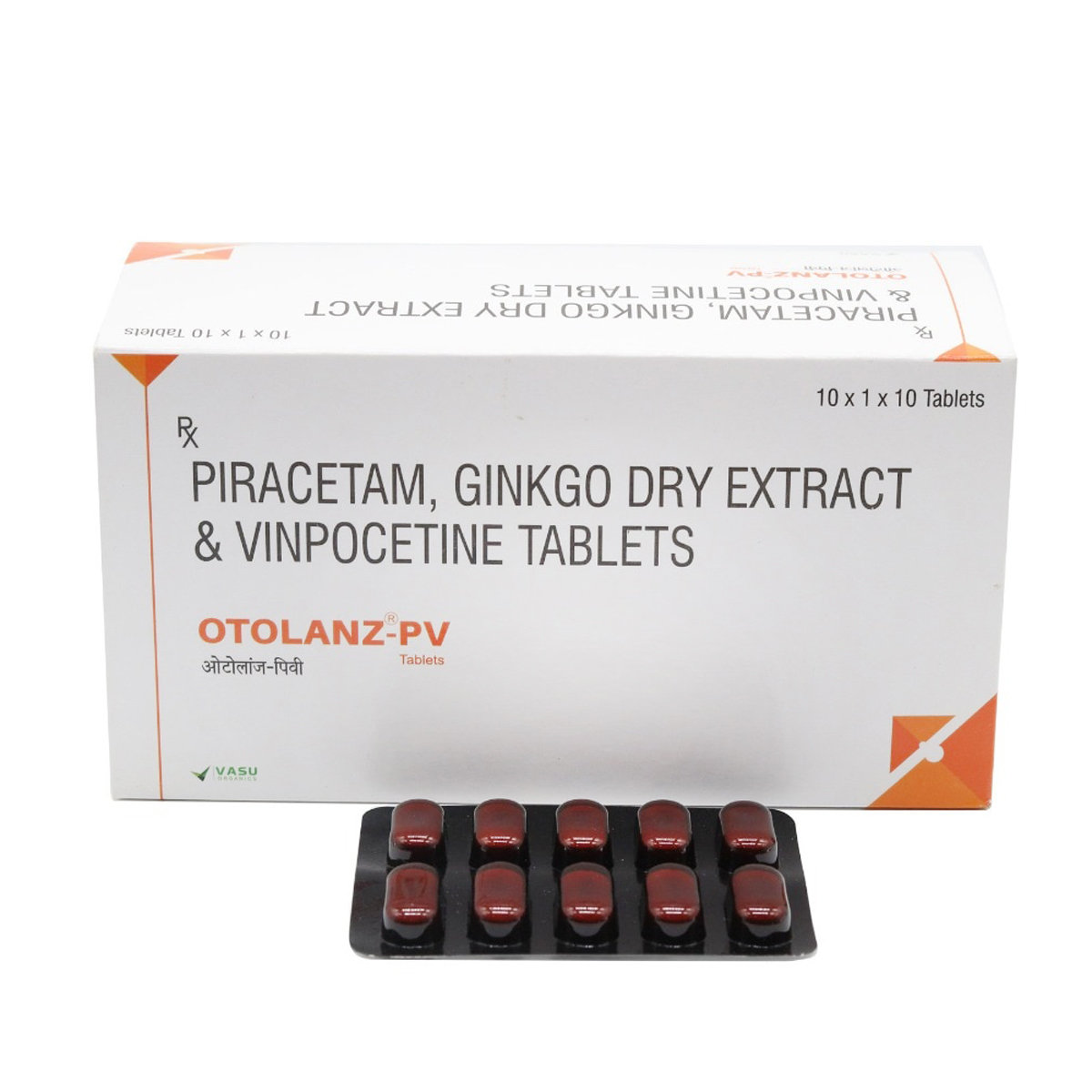

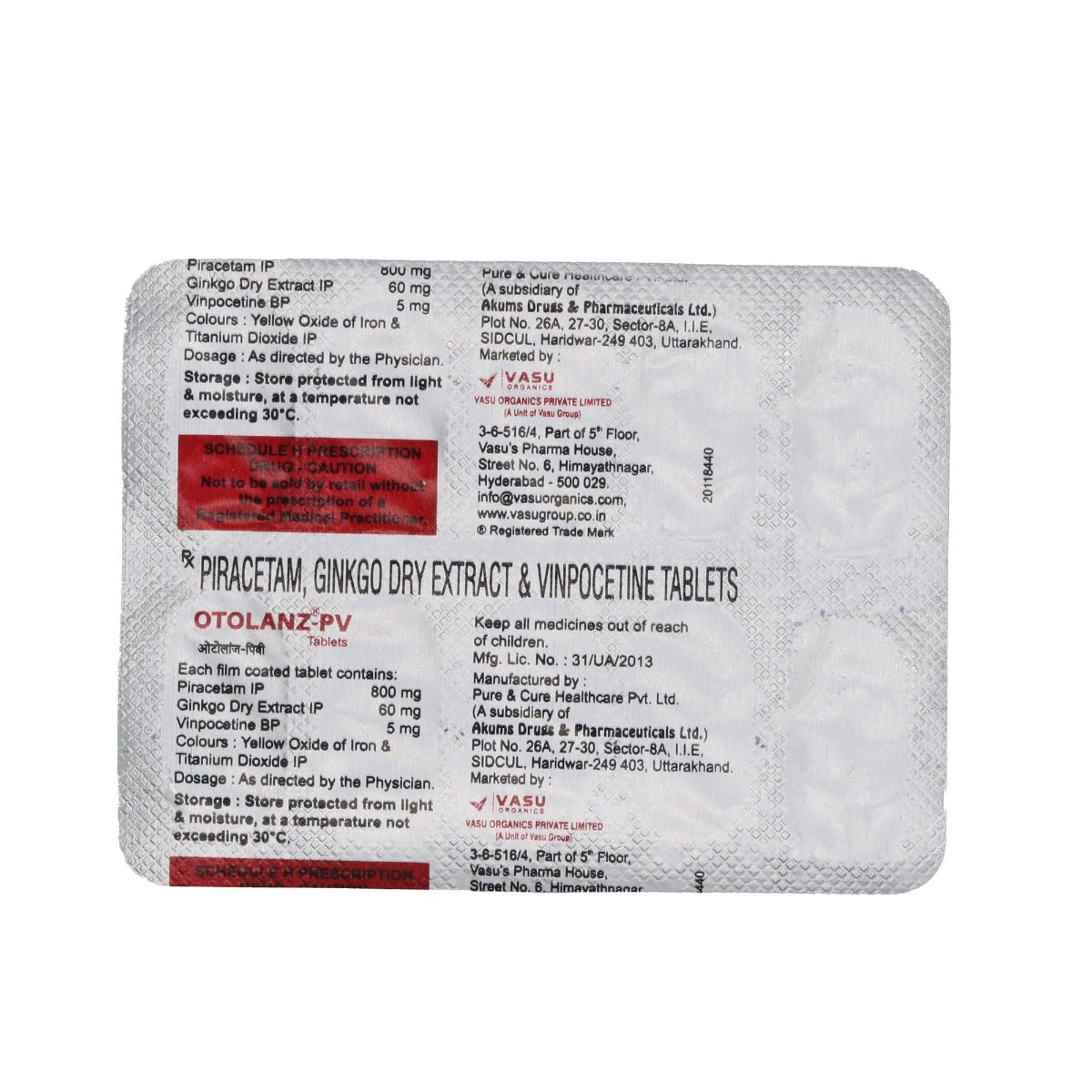



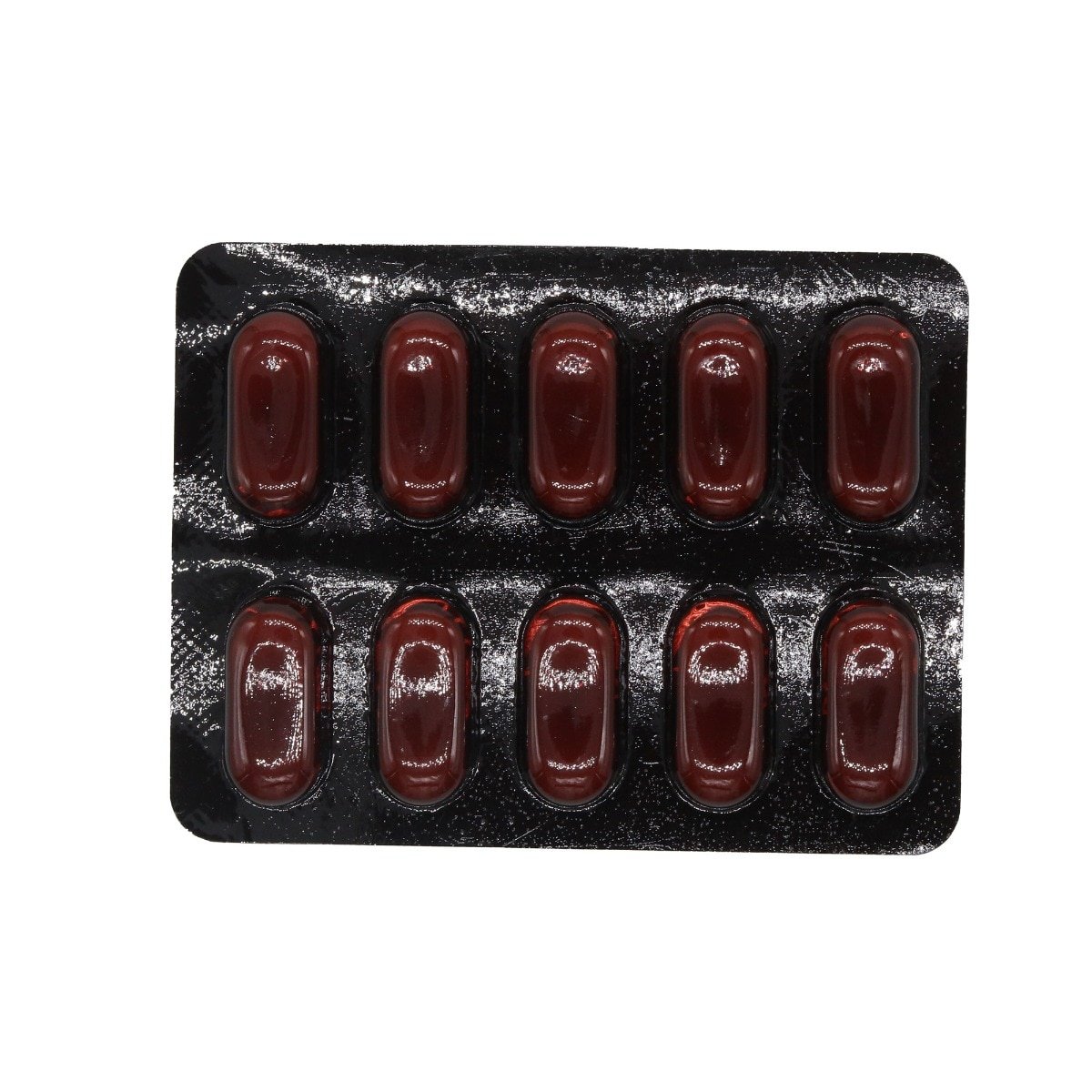

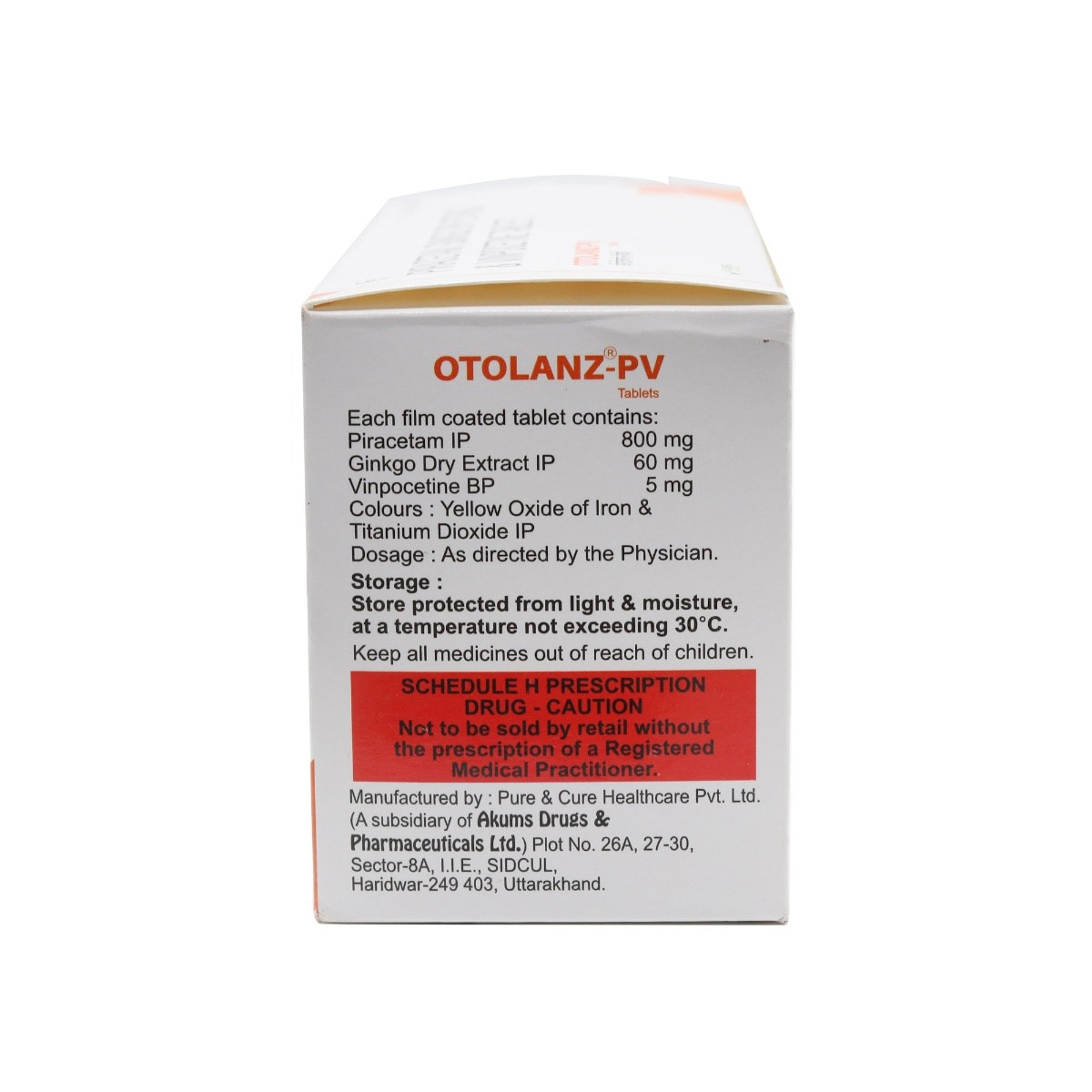
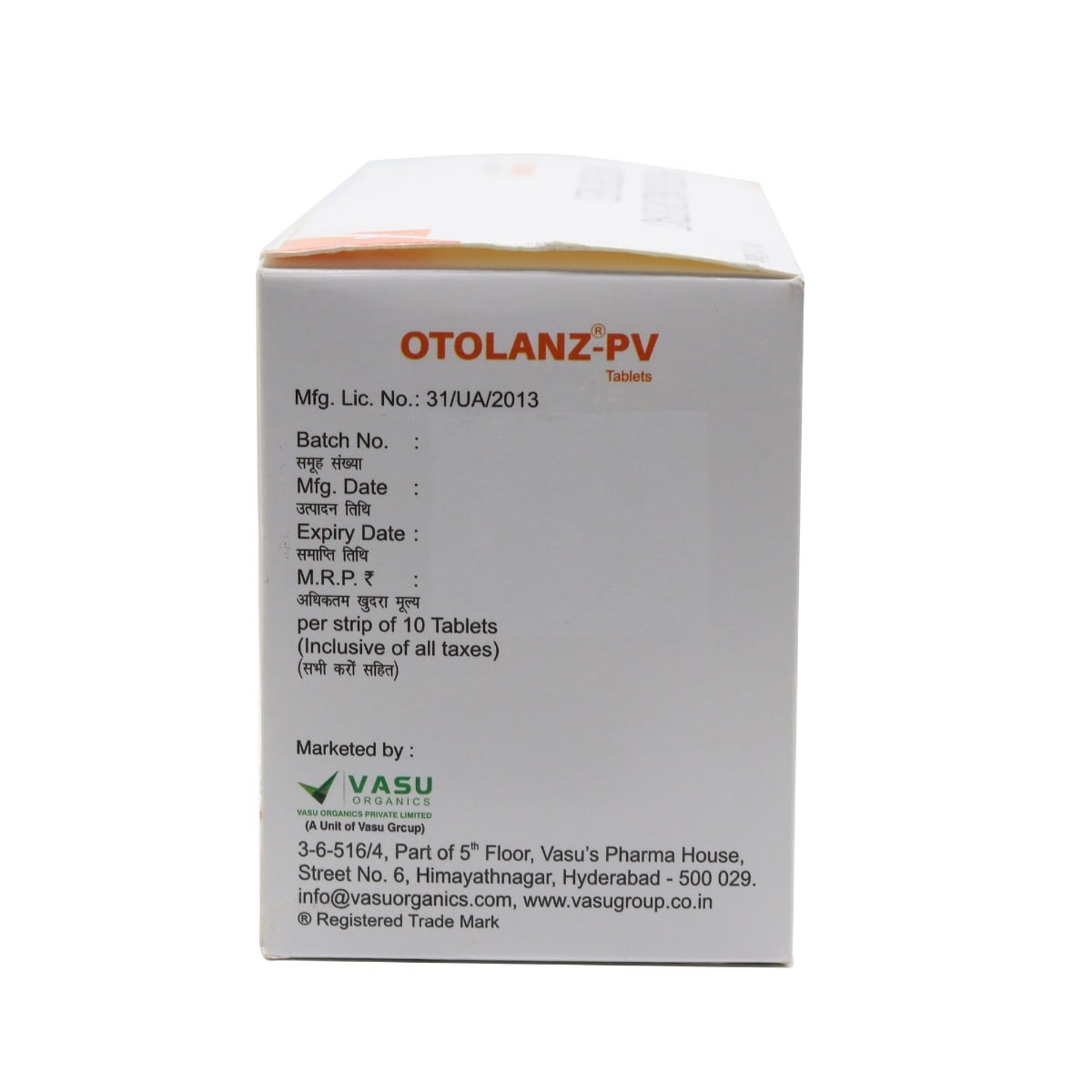



_0.jpg?tr=q-85)
